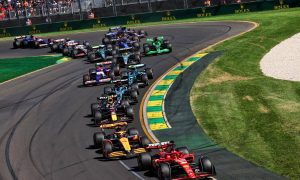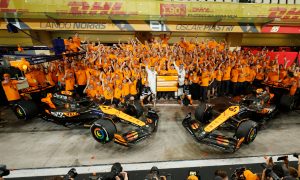They say you shouldn’t talk with your mouth full, but Eric Silbermann risks the wrath of Mrs Manners by having breakfast with a pot-pourri of paddock people.
When I was a kid, like most boys my age, I wanted to be a racing driver, a millionaire of course, I also wanted to be a doctor like my father and, inevitably, I wanted to go out with Francoise Hardy. Several decades on and all I’ve got to show for those childhood dreams is a fair collection of records by the French chanteuse. Dr. Jonathan Palmer on the other hand seems to have done rather better: he’s a qualified medical doctor, he raced in Formula 1 and, although we didn’t discuss anything as vulgar as money, I assume he’s doing alright, given as how he owns most of the race circuits in Britain. However, as far as I know, he never went out with Francoise Hardy. “JP” as he was always known in his racing days is back in the F1 paddock on a regular basis now, for the obvious reason that his son Jolyon is doing a fair few Friday morning practice sessions as reserve driver for the Lotus team.
A lot of young drivers suffer from proudandmeddlingdad syndrome, but you’ve actually done the job of driving in F1, so is it hard not to offer Jolyon the benefit of your pearls of wisdom?
Yes, I have done the job, but I don’t think that gives one a right to meddle, nor can I se any benefit in doing so. For a long time now, I’ve stood back from whatever Jolyon’s been racing. One of the things that is very different to racing in my day, is how sophisticated the teams are, with all the data and the level of engineering. The reality is that, once anyone gets even to Formula 3, let alone Formula 1 or GP2, there is very little that one can add and certainly getting involved and asking what’s going on on the set-up front is something I’ve not done for years. Having said that, there are times when Jolyon will concede that I might have a point when I suggest you might just consider this strategy…but I don’t proffer opinions very often and I think he’s all the better for it. And another important thing is the fact the team appreciates that. Jolyon and I have enjoyed a very good relationship with all his teams in GP2 and now with Lotus in Formula 1. I think they appreciate that I concentrate on the bits that are important, the commercial side, leaving him to get on with the driving, unencumbered with any meddling from me.
So, what’s the current situation with Jolyon?
Obviously, being GP2 champion last year was very important to him as his goal is F1 of course. Our total focus has been to try and make sure he can get a Formula 1 race seat as soon as possible. That wasn’t possible for this year, but having said that, we have a very good situation and we are delighted to be with Lotus F1. He’s going to be doing a fair few FP1 sessions and the more he gets used to it, the more the engineers respect his feedback, the more comfortable that situation will be. Obviously the race drivers never like losing an FP1 session, but they both understand that’s the way things are in F1. It’s a great opportunity for Jolyon to learn about F1 cars, how to be quick in them, how to look after the tyres, how to work with the engineers, how to deal with the PR side, the whole mix of things at F1 level is hugely challenging. Lotus F1 has been brilliant; a very friendly and welcoming team.
People are getting a foot in the F1 door based on the money they are bringing and that must make it hard on guys trying to make it on talent alone. It’s always been the case but there’s more of an emphasis on it at the moment, especially with the Sauber affair in Melbourne.
We know the guys involved and to be fair, both Felipe Nasr and Marcus Ericsson are very good drivers. They’ve had the support from sponsors who can invest a substantial amount to help the team. Most drivers, me included, even Ayrton Senna and Michael Schumacher included, brought some money to a team to get themselves into F1 and it’s not that surprising. The only exceptions to that are the Red Bull scheme and maybe McLaren. In general most drivers have brought money with them. The scale of that amount of money has increased of course. Jolyon and Nasr had great fights in GP2 (with Jolyn winning the title though), in fact he’s been team mates with both of them and respect to them for being able to generate that income.
You came from a generation where drivers gradually worked their way up to F1, so what’s your take on all the baby drivers parachuting straight into the sport?
I didn’t do any karting whatsoever. I started racing at 17 years old, at the age that Max Verstappen is racing a Formula 1 car and I was spluttering around in a Frogeye Sprite. But there’s too much of a fixation or too much zeal about taking very young drivers now. Clearly Verstappen is doing a very good job and is an exceptional talent. But, to put it in perspective, there are quite a few Formula 1 drivers on the grid now who are well over 30 and doing a very good job indeed: Kimi, Felipe, Fernando or Jenson, these guys are still very competitive and they may well argue they are better drivers than ever. They are nearly 20 years older than Max Verstappen.
I think the age thing is secondary and should not be focussed on too much. Max is earning his place in F1 but he is there because he was picked up at a very young age by the Red Bull scheme. If it hadn’t been for that he wouldn’t have been plucked out of F3 and launched into F1 – I don’t see it happening again, irrespective of the Super Licence points structure that’s now in place.
Let’s look at another of your hats now, the Circuit Owner. It’s a topical angle with news that there’s no German GP and other European races under threat. Is Formula 1 a bad thing for a circuit to have to host?
First of all, I should make it clear that whilst I own five circuits in the UK, none of them has got the remotest chance of hosting a Grand Prix. I therefore have no direct experience of Grand Prix economics. But I do think it’s a great shame that Germany will not have a Grand Prix this year, it seems unbelievable, given that we have Mercedes and Vettel doing well. But, at the end of the day, one has to recognise the fact that a lot of motor racing, a lot of Formula 1, apart from the FIA’s role, is a commercial business. And it’s the Commercial Rights holder’s business as with any business, to generate as much sustainable revenue and profit as possible. It’s a fact that other countries are able to pay more for a Formula 1 race than many of the Western countries. In every case, that is because there is government support towards the fee for hosting the race and there is no denying that Abu Dhabi is a spectacular track, while Bahrain has a fantastic paddock. One has to be realistic when it comes to crowd figures: TV audience and media exposure is a far more dominant factor than a live crowd. It’s a shame that in Bahrain there aren’t grandstands heaving with people but that’s probably because the of the way Formula 1 and live entertainment in general is changing.
I think it's a great shame that we’ve not got a French GP or a German GP and Silverstone is clearly under threat as well. I don't think it’s anybody’s fault. It’s the Formula 1 rights holder doing what it should do and trying to run a successful business, generating as much profit as it can. Who knows where we will go next: Indonesia? Nigeria? Maybe they want to have a Grand Prix.
But we also need to accept that, over the life of this planet, there have been many empires that have come and gone, the Greek empire, the Egyptian empire and everything moves in cycles. That’s probably what’s happening in Formula 1. Probably the nostalgic view we have that Europe should be the focus of Formula 1 is obsolete and a new era is coming along.
What I would like to see, is that as part of countries wanting to host a grand prix, I do think it would be very good – and it wouldn’t be a very big cost when put against the costs of hosting the race – there should be some budget set aside to drive and generate a motorsport culture in that country, with race schools, junior championships and even ways of involving spectators.
I do think it's a shame that we have or have had grands prix at spectacular venues such as Korea and China, but where it’s proved hard to generate a sustainable volume of spectators paying enough to make a contribution to the rights fee, in the way that Silverstone do. Silverstone gets no government support and its ability to pay the rights fee is totally dependent on a ring fenced business of running a circuit, taking their money and revenues on the number of spectators, the price they pay, the number of upgrades they pay for, such as grandstands and food. That’s all they have in order to pay the rights fee.
Let’s see how things develop. I suspect there is a degree of concern among various parties, from the rights holder, from CVC, to the manufacturers. Because what they want is to have a presence in countries that will help their business, be it selling cars or getting people on seats and growing the TV rights fees.
At this point, our conversation was interrupted by the arrival of Prodrive boss, David Richards. Years ago, when I worked for a fuel company, he would ask me if I could spare some oil for his rally car. He’s done rather well for himself since then … but still no sign of Francoise Hardy.











